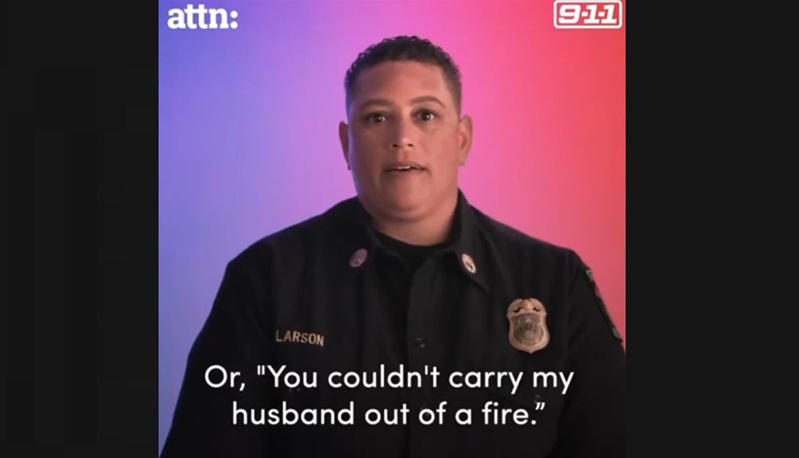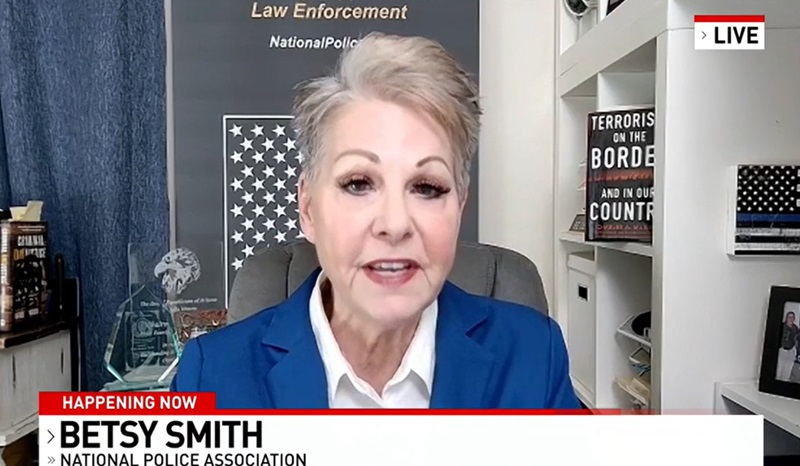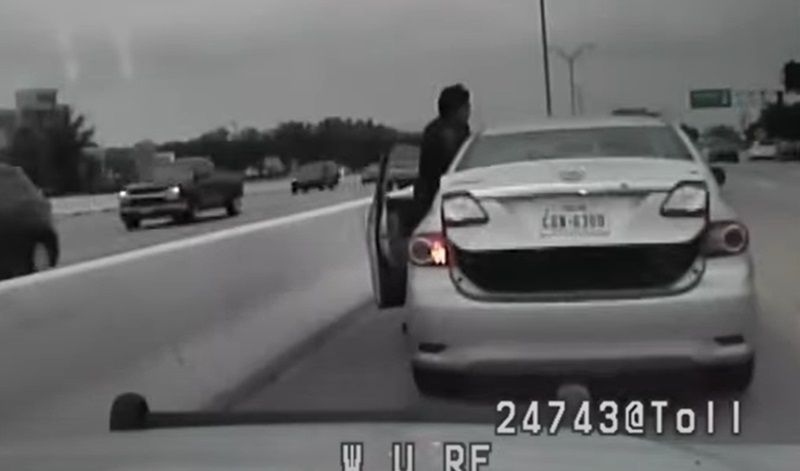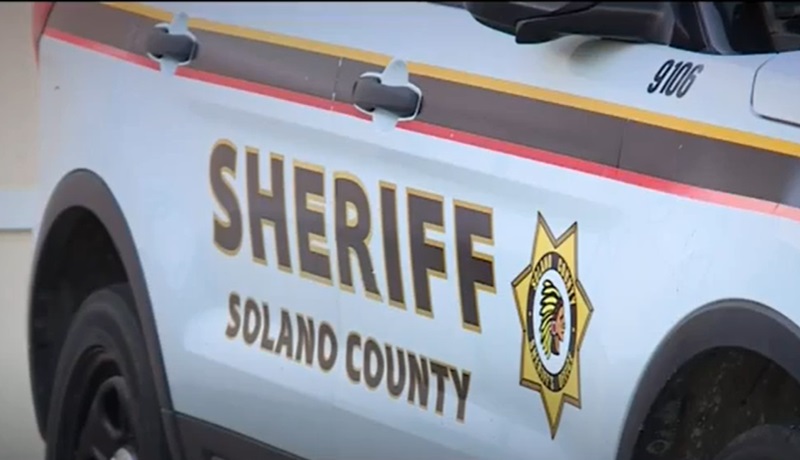
In major athletic events with gobs of fans in massive arenas and stadiums, law enforcement officers are among the spectators who naturally want to rally their fave teams and players while also expecting safety in the stands. Hence, police officers, deputies, and state troopers are always assigned to work at athletic competitions…and it can get dicey.
In a recent NBA basketball game in Miami, a cluster of cops untangled a mix of men embroiled in fisticuffs between narrowly spaced and inclined rows of seats, precariously perched while swinging wildly at one another.
Albeit gruesome to watch the brief fight footage recorded by a spectator, if you are disinclined to view the melee, I attached a screenshot to lessen exposure to the brawlers.
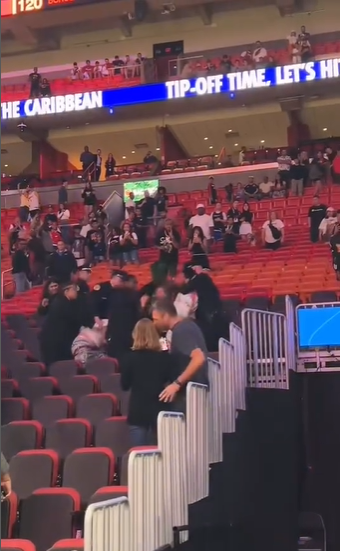
(Screenshot courtesy of Miami Certified.)
Let’s concentrate on the police who intervened. More importantly, we should herald their presence, exhibiting how imperative it is to have LEOs, contrary to the noisy climate of anti-police barkers.
The ratio of people in the United States and sworn LEOs may give the appearance that the scale is lopsided. It is.
Per the current US Census Bureau, there are roughly 336 million folks whose public safety is served by approximately 850 thousand cops. Consider on-duty officers spread out among various security-oriented assignments such as basketball games…and the starkly outnumbered factor is glaring. Thankfully, only a modest percentage of our species generates most dustups.
The cops you see working at events such as concerts, sporting events, state fairs, community festivals, etc., are largely considered off-duty and ordinarily compensated by the event coordinators.
In law enforcement agencies across America, a sworn or civilian employee serves as a point person, coordinating police assets requested by private entities seeking security at their event—sometimes of their own volition, if not required. Typically, local ordinances stipulate over a certain number of attendees, police presence is mandatory. If alcohol is to be served at the venue, LEOs must be on-scene.
The Miami Heat basketball game we introduced (above) is an example…and look what happened.
“Thankfully police were there!” wrote a Miami Certified spokesperson. Indeed.
Take the grander context: Any contentious or violent event Anywhere, USA, engenders involved parties and/or spectators to summon the police. Dwindled due to anti-cop noisemakers or not, cops are responding as expected.
I worked at plenty of athletic events and concerts in my police career. I’m happy to say most fans of teams and bands also respect cops. It is the few (as seen above in Miami) that go against the grain, likely loaded with brew and whatever else they consumed, creating a ruckus and letting fists fly wildly.
Since we already explored the imbalanced ratio of citizens:cops at large venues, any arrest(s) means one or more officers are taken from the faction of first responders. In my experience with handcuffing brawlers in the bleachers, it usually boils down to all involved parties not prosecuting one another. Sadly, some cops get injured in breaking up these fights.
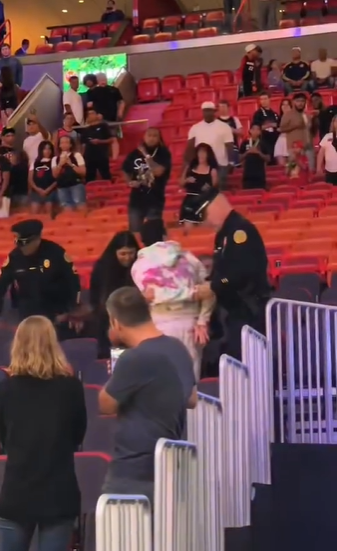
(Screenshot courtesy of Miami Certified.)
In that context, event coordinators (stadium ownership) regularly issue trespass warnings to those who made a stink in the stands, barring them from returning to the venue. (Enforcing that is another story altogether.)
At the Miami Heat game, cops were present for a variety of reasons. It is not uncommon for youngsters to somehow get separated from their adult parents or whoever accompanied them. Law enforcement officers are summoned, a BOLO (Be On the Lookout) is issued across police frequencies, and a search is conducted. Thankfully, the police are there!
Besides things that occur within the event venue, outside parking areas and traffic flow can be a nightmare, activating cops to direct the push of cars and pedestrians crisscrossing the massive lots. Lockouts are a thing. Preventing auto burglaries is another task for cops…but they do happen (only so much ground can be covered by a modest amount of LEOs overseeing a burgeoned population).
To make ends meet, law enforcement officers put in for off-duty (aka “extra duty”) gigs. It helped me put food on my family table, so I routinely put in for extra duty work to supplement my base salary. Working security details was a regularity throughout my career…as it is with many cops in the U.S.
In September 2024, I came across a post heralding a Florida Highway Patrol trooper who has been working security at football games for 15 years. He was being honored for this milestone while also being celebrated for his tenure as a trooper.
Enter Sgt. Calvin Long…
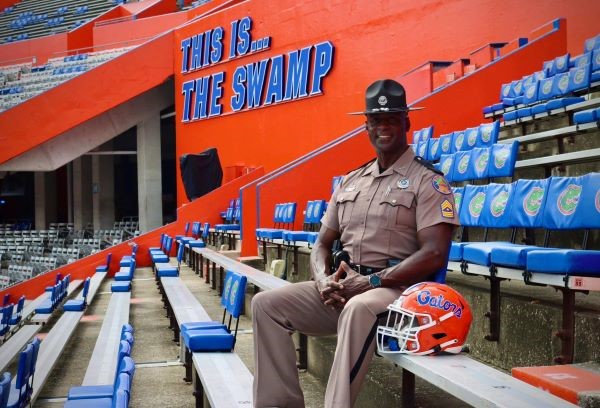
(Photo courtesy of the Florida Highway Patrol.)
“With 33 years of experience as a Florida Highway Patrol officer, I have been assigned to the University of Florida football team for the past 15 years. Throughout my career, I have consistently demonstrated a passion for helping people, and my role as a Florida State Trooper has provided me with numerous opportunities to make a positive impact on the lives of others,” Sgt. Long explained.
“One of the most rewarding aspects of my work with the University of Florida football team is the chance to interact with young men who come from backgrounds similar to my own.
“By sharing my experiences and insights, I strive to have a positive influence on these individuals as they transition from teenagers to young adults.”
Thankfully, police are there…to serve as role models, among many other things.
An icon at University of Florida Gators football games, Sgt. Long has a last name that matches his service to the players, coaches, and the throngs of fans in the stadium bleachers, keeping the peace.
However, beer bravado can sometimes erupt in unpleasant ways, requiring cops to step in and settle the score. I’m sure Sgt. Long is A-listed in terms of refereeing debacles between ticketholders heated by opposite opinions about team talents or whatever.
On that note, a Florida Gators fan commented on this featured trooper, saying, “Season Ticketholder with the best seat in the house!!!” That comment also applies to when Sgt. Long is patrolling the highways and byways of the Sunshine State .
However, he is an exception to the rule we described above…defining extra-duty gigs.
You see, the FHP assigns troopers to a dedicated security detail for the entire Florida Gators football team and its calendar of competitions, meaning duty is split between routinely working at the stadium on game day and otherwise patrolling the roads during the team’s off-season (re-assigned to patrol, just like School Resource Officers when school is out for the year).
Whether on the gridiron or asphalt pathways coursing through Florida, Sgt. Long is widely recognized as being there, serving as an honorable man in a law enforcement uniform, seen by the multitudes.
We’ve all seen the loony, beer-filled, sometimes naked streakers who take to the grassy field and run around for attention and 15 minutes of televised fame, pursued by cops who are usually right there on the sidelines. Thankfully, the police are there to flesh out the shenanigans and save folks from indecency and trauma!
Make a difference. Support the NPA.



